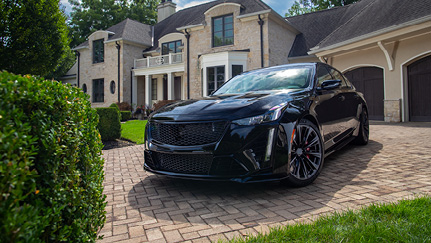Loading...
Protect your high-value auto from damage and theft

Sophisticated cars with high-tech features can be more expensive to repair since the sensors and cameras tend to be located in the bumpers, front grill area and side mirrors — the most likely places cars get damaged in minor accidents.¹
Nationwide® Private Client Risk Solutions recommends the following simple and low-cost measures to help prevent damage to your vehicle:
- Have your car checked regularly by an expert mechanic, ideally at the dealership where you purchased your vehicle, as they are familiar with your car model’s specific high-tech features
- Update your vehicle operating system right away if your manufacturer updates the software for your car
- Use covered parking lots when possible, especially if you live in parts of the country with hail and freezing weather
- Whenever possible, park in an area where other cars are not directly adjacent to your vehicle to avoid dents and scratches
- Don’t leave your vehicle unlocked and unattended; many new models allow you to remotely start your vehicle while it is still locked
- Find out if your car includes a tracking device to help locate it if stolen, and consider installing one if it does not
- Many new cars are equipped with a valet feature that you can utilize to:
- Lock out the vehicle navigation system, including blocking your address book
- Limit the vehicle’s speed
- Disable the audio system
- Disable the garage door feature
- Disable the interior trunk opening switch
- Lock the glove box and other storage areas
In addition to protecting your vehicle, thieves may target high-tech, high-value cars expecting valuables to be left inside. According to AOL Autos, $1.25 billion in personal items and accessories are stolen from vehicles in about 1.85 million thefts each year.² While there’s no way to 100% deter these kinds of thieves, a little extra effort on your part can go a long way when it comes to protecting your car and valuables.
- Park where there’s plenty of pedestrian and vehicle traffic.
- If you’ll be away from your car after dark, park in a well-lit area or near a lamppost.
- Choose a lot with an attendant over one without.
- Always lock your vehicle and roll up windows when you park, even when inside your home’s garage. Even if you have no valuables inside, a thief could steal your garage opener, personal information from an unlocked glove box such as your vehicle registration, toll pass or even steal your vehicle.
- Keep your valuables out of sight. It’s best to not leave anything visible inside your car, even if you perceive it to be of little or no value.
- While your trunk is better than the passenger compartment for shopping bags, backpacks, laptops and other valuables, an experienced thief will often stake out a parking lot and watch you transfer your things there. Before you even get to where you’ll be leaving your car unattended, move your valuables to the trunk or wherever they’re out of sight if you must leave them in your vehicle.
- Lock your glove box to help protect personal information on your vehicle registration card.
- Don’t store your home address in your vehicle GPS system in case your car is stolen so the thief can’t easily find your home and use the garage door opener to gain entry.
If you have any questions, please contact your agent or Nationwide Private Client Risk Solutions professional. For more information on how you can help prevent losses, visit nationwide.com/solutionseries.
We offer this information to assist you in making decisions that can help mitigate your risk. While we cannot address every possible scenario or guarantee these tips will work for you, our goal is to support your efforts to protect yourself and your family.
[1] insureinfoblog.com/2018/02/high-tech-cars-equal-high-cost-repairs
[1] AOL autos: cnn.com/2009/LIVING/wayoflife/04/15/aa.avoid.car.break.ins
Sources: nationwide.com, iii.org